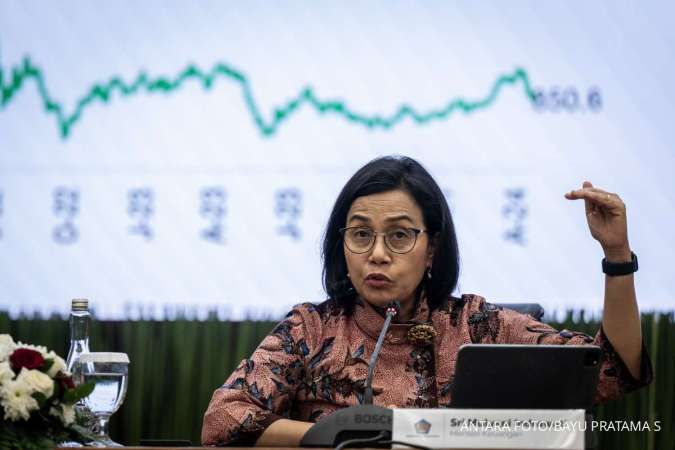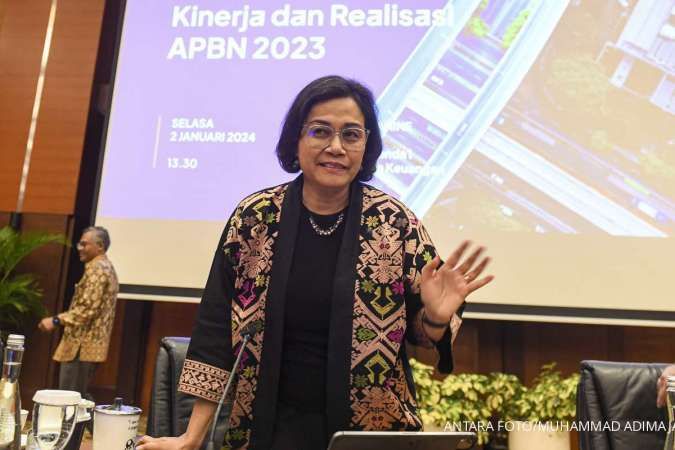MACROECONOMICS - JAKARTA. Indonesia's economy has once again demonstrated robust growth amidst global economic stagnation and financial market turmoil.
In the first quarter of 2024, Indonesia's economy grew by 5.1% year on year (YoY), primarily bolstered by strong domestic demand and the support of the State Budget (APBN). This growth has had a positive impact on reducing the open unemployment rate.
Finance Minister Sri Mulyani said that despite global uncertainties, Indonesia's economy continues to show its resilience, as evidenced by the growth achieved in the first quarter of 2024. The quality of growth has also significantly improved, reflected in the high job creation rate, which has managed to reduce the Open Unemployment Rate (TPT) to a level below pre-pandemic levels.
"Going forward, the APBN will continue to be optimized to maintain economic stability, stimulate growth acceleration, and create jobs," said Finance Minister Sri Mulyani Indrawati in her statement on Monday (6/5).
On the expenditure side, household consumption and Non-Profit Institutions Serving Households (LNPRT) grew by 4.9% and 24.3% YoY respectively. The still strong growth in household consumption was mainly driven by controlled inflation, increased economic activity during Ramadan, salary increases for civil servants, and the provision of holiday allowances.
Indirectly, government spending related to the conduct of elections also helped boost household consumption through the provision of election officer honorariums. Meanwhile, consumption by LNPRT surged, primarily driven by various activities related to the 2024 elections.
Government Consumption Expenditure (PKP) grew by a double-digit figure of 19.9% YoY. The strong performance of employee spending in the APBN was one of the factors supporting this strong growth, especially through salary increases for civil servants and the provision of Eid allowances with 100% performance allowances in the first quarter of 2024.
On the other hand, goods spending and social spending, which are part of the PKP, also increased significantly. PKP contributed 1.1% to the economic growth of the first quarter of 2024, the third largest after community consumption and Gross Fixed Capital Formation (PMTB).
PMTB or investment growth was recorded at 3.8% YoY. Government capital spending related to infrastructure also drove building investment activity. The increasing downstreaming of natural resources, excellent macroeconomic performance, and social-political stability maintain Indonesia's attractiveness as an investment destination.
The performance of private sector investment is also reflected in the realization of Foreign Investment (PMA) and Domestic Investment (PMDN) in the first quarter of 2024, which grew by a high 22.1% YoY with a balanced distribution of investment between Java and outside Java.
The global economic slowdown trend has affected the growth of Indonesia's exports and imports. In the first quarter of 2024, real exports still grew by 0.5% YoY, supported by an increase in service exports due to the strong flow of foreign tourists to Indonesia.
On the other hand, the export volume of main products such as iron and steel and mineral fuels remained strong, each growing by 35.8% and 5.4% YoY in the first quarter of 2024. Meanwhile, real imports also grew by 1.8% YoY in the first quarter of 2024.
Overall, the net export contribution (exports - imports) to growth contracted by 0.2%.
From the production side, leading sectors continued to grow positively. The manufacturing sector in the first quarter of 2024 grew by 4.1% YoY, driven by still strong domestic demand and downstream policies.
The success of downstream policies is reflected in the basic metal industry sub-sector, which continued to grow by double digits, namely 16.6% YoY in the first quarter of 2024. Strong domestic demand was mainly supported by the growth of the food and beverage processing industry, which grew by 5.9% YoY.
In line with the positive growth of the manufacturing sector, the trade sector also grew by 4.6% YoY, mainly driven by increased demand during Ramadan.
Meanwhile, the agricultural sector recorded a contraction of 3.5% YoY, influenced by the shifting harvest season due to prolonged drought caused by El Nino, which delayed the planting season.
/2024/04/26/644304113p.jpg)














